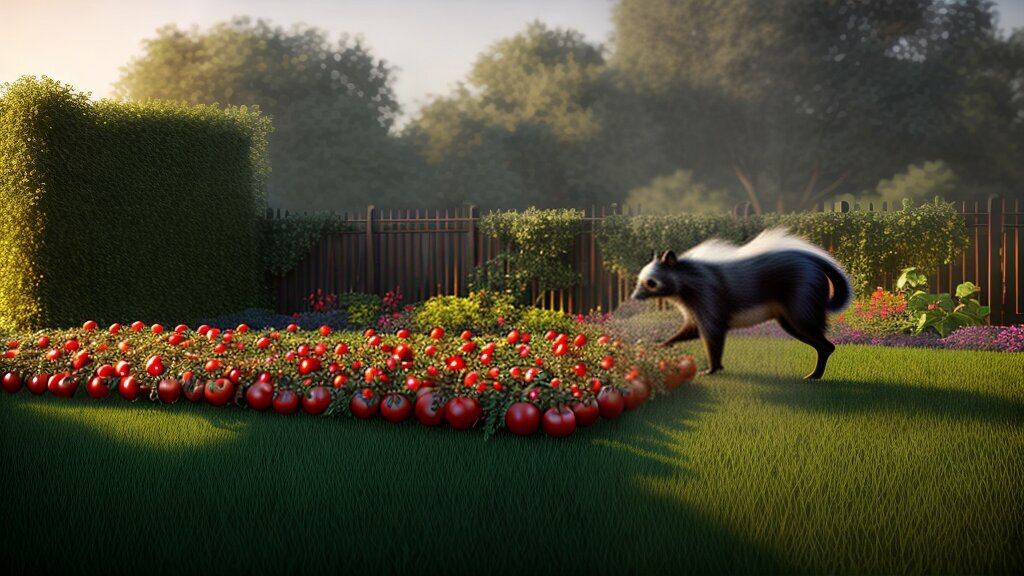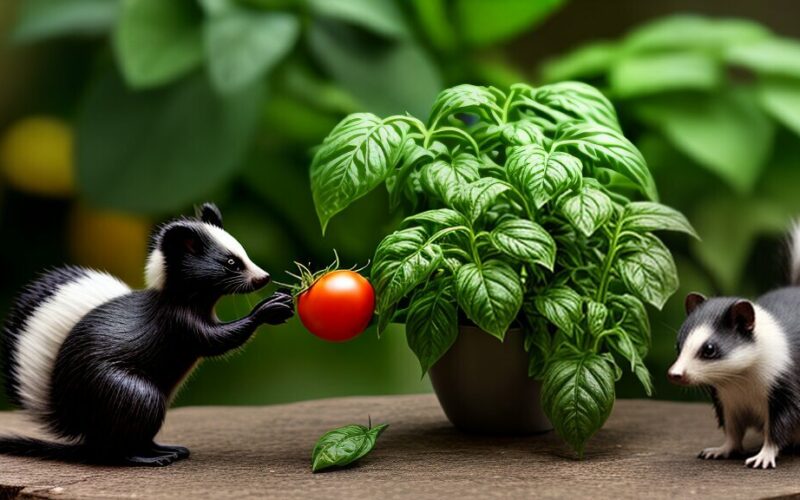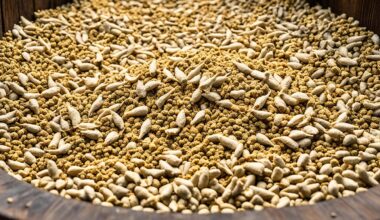As a garden enthusiast, you take pride in growing healthy and thriving plants in your yard. However, you may face challenges when uninvited guests like skunks invade your garden and cause damage to your precious crops. One question that may come to mind is whether skunks have a tendency to eat tomatoes and how to prevent them from destroying your tomato plants. In this section, we will explore the behavior of skunks in relation to your garden and address your concerns about skunks and tomatoes.
Key Takeaways:
- Skunks are primarily omnivorous creatures with a varied diet that includes fruits, vegetables, insects, and small mammals.
- While skunks may consume some fruits and vegetables, their preference does not typically lean towards tomatoes.
- Skunks can cause damage to tomato plants in various ways, including partially eaten or damaged tomatoes, diggings around the plants, and footprints on the soil.
Skunks’ Diet and Tomato Predation
Skunks are fascinating creatures known for their distinct black and white coloring and potent spray. They are classified as omnivores, which means that they consume both plant and animal matter. Their diet includes insects, small mammals, fruits, and vegetables. However, do they have a tendency to eat tomatoes?
While skunks may occasionally consume tomatoes, it is not typically their preferred food. They are unlikely to cause significant damage to your tomato plants unless they are lacking other food sources. Skunks are more likely to feed on insects and small rodents that may be present in your garden.
It is important to understand their behavior towards tomatoes and the potential damage they can cause. Skunks may dig around your tomato plants in search of insects or small rodents, damaging the roots in the process. They may also take a bite out of your tomatoes, leaving them partially eaten and damaged.
Therefore, it is essential to monitor skunk activity in your garden and take appropriate measures to protect your tomato plants. In the following sections, we will explore the signs of skunk damage to tomatoes and effective pest control measures to prevent skunk damage.
Signs of Skunk Damage to Tomatoes
Skunks can cause damage to your tomato plants in various ways. Look out for the following signs:
| Signs of Skunk Damage: | What it indicates: |
|---|---|
| Partially eaten or damaged tomatoes | Presence of skunks in your garden |
| Diggings around the plants | Skunks are searching for food and may continue to damage your plants |
| Footprints on the soil | Presence of skunks in your garden, and they may return to cause more damage |
If you notice these signs, it’s important to take quick action to prevent further damage to your tomato plants.
Image source: 
Protecting Your Tomatoes from Skunks
If you want to safeguard your tomato plants from skunk damage, there are several preventive measures you can take. These measures include:
Installing Fencing
Installing fencing around your garden can be an effective way to keep skunks out. Make sure any openings in the fence are no more than 4 inches in diameter, as skunks can squeeze through small spaces. The fencing should be buried at least 12 inches into the ground and angled outward to discourage skunks from digging underneath.
Using Deterrents
Motion-activated sprinklers can be a great deterrent for skunks. When they approach the tomato plants, the sensor will activate, and a spray of water will frighten them away. You can also use natural repellents like predator urine or ammonia, which emit a strong smell that skunks don’t like.
Eliminating Potential Food Sources
Skunks are attracted to food sources like garbage, pet food, and fallen fruit and vegetables. To reduce the chances of skunks entering your garden, make sure to remove these food sources and keep your garden clean. Also, consider planting companion plants that can help repel skunks, such as marigolds or alliums.
By implementing these strategies, you can significantly reduce the risk of skunks targeting your tomatoes. Remember to inspect your plants regularly for signs of damage and take action promptly to prevent further harm.

Natural Skunk Deterrents for Tomato Gardens
If you’re looking for a natural way to protect your tomato plants from skunks, there are several options available. These methods are safe for the environment and won’t harm the skunks, but can effectively deter them from your garden.
Plant Strong-Smelling Herbs: Skunks have a keen sense of smell, so planting strong-smelling herbs like mint or lavender near your tomato plants can make your garden less appealing. These herbs are also great additions to your garden for cooking and tea-making.
| Natural Repellents | How to Use Them |
|---|---|
| Citrus Peels: | Take some citrus peels and place them around your tomato garden, ensuring they don’t touch the plants. The strong scent of the citrus can deter skunks from coming near. |
| Cayenne Pepper: | Mix a tablespoon of cayenne pepper with a gallon of water, and spray the solution around the edges of your garden. Keep the spray away from your tomato plants, as it can be harmful to them. |
Create Noise Disturbances: Skunks are easily frightened by loud noises, so creating noise disturbances around your garden can keep them away. Try using wind chimes or even a radio set to a talk show station, as the sound of human voices can also be a deterrent.
Remember, prevention is key when it comes to skunk control. By using these natural deterrents in combination with sealing off entry points and removing potential attractants, you can significantly reduce the risk of skunks targeting your tomato plants.

Integrated Pest Management for Skunk Control
Integrated Pest Management (IPM) techniques can help control skunks in your garden. To effectively implement IPM, you need to follow a combination of preventive measures and humane methods to manage skunks.
Preventive Measures
To prevent skunks from entering your garden, seal off potential entry points such as holes or gaps in fences, sheds, or other structures. You should also eliminate potential attractants like food waste or pet food that may draw skunks to your garden.
If skunks have already been spotted in your garden, you can attempt to deter them by installing fencing that is at least three feet tall, and burying it at least six inches in the ground to prevent skunks from digging under it.
It is also crucial to regularly monitor your garden and promptly remove fallen tomatoes or other debris that may attract skunks.
Humane Methods
Live trapping is a humane method of skunk control. Bait the trap with food, such as canned cat food or sardines, and check the trap at least once a day. If a skunk is trapped, cover the trap with a dark cloth to calm the skunk and reduce its stress, then call a professional wildlife removal service to remove the animal safely and humanely.
It is also important to consider relocating the skunk instead of simply releasing it nearby, as this could cause further problems. Check with your state and local wildlife agencies before relocating skunks, as there may be specific regulations that apply.
Summary
By combining preventive measures like sealing off entry points, eliminating attractants, and installing fencing, with humane methods like live trapping and relocation, you can implement an effective IPM strategy for skunk control in your garden. Remember to always prioritize humane and safe methods of skunk management.

Tips for Skunk Control and Tomato Preservation
To ensure your tomato plants stay safe from skunks, follow these tips:
- Maintain a clean garden by removing fallen tomatoes or debris that may attract skunks.
- Regularly inspect your tomato plants for any signs of damage or skunk activity.
- Install fencing around your garden to deter skunks from entering.
- Use natural skunk deterrents such as mint, lavender, citrus peels, or cayenne pepper.
- Consider implementing an integrated pest management strategy for effective skunk control.
By being proactive and taking these measures, you can protect your tomato plants and maintain a healthy garden environment.

Note: Skunks are generally nocturnal animals and prefer to stay hidden during the day. If you do encounter a skunk in your garden, remember to keep your distance and avoid any sudden movements that may startle them.
Conclusion
Congratulations – you now know how to protect your tomato garden from potential skunk damage! While skunks may occasionally eat tomatoes, they generally do not prefer them and will only consume them if no other food sources are available. By implementing preventive measures such as fencing, natural deterrents like strong-smelling herbs or spicy repellents, and employing humane skunk control methods like live traps, you can safeguard your tomato plants and enjoy a thriving garden environment. Remember to regularly inspect your plants, maintain a clean garden, and promptly remove fallen tomatoes or debris to prevent skunk attraction. With these tips, you can rest assured that your tomatoes will remain safe and delicious for you to enjoy.






